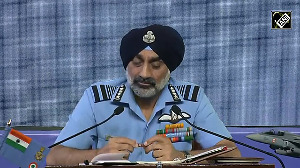As an analyst at CRS, which is a kind of in-house think-tank for the United States Congress, his reports on Pakistan and terrorism and US-Pakistan relations are eagerly studied by Washington policymakers. He spoke to Managing Editor (National Affairs) Sheela Bhatt a day before Congress went into recess for the July 4 break.
He discussed the future of the India-US civilian nuclear agreement in its current form and the possibility of it being passed by the United States Congress.
What is your take on the Indian government's decision to go ahead with the deal? What is the next possible scenario?
Obviously, the steps are quite clear. India will have to finalise the safeguards agreement and get it cleared from the board of the IAEA (International Atomic Energy Agency). The NSG (Nuclear Suppliers Group) will have to agree to alter its guidelines (to allow) international trade (of nuclear material with India).
Once the resolution is ready, it will be presented in Congress for a simple up and down vote. It is expected that there will not be any amendment process.
The key here is that, according to our laws, the Congressional calendar in US requires a continuous 30-day session once the president introduces the bill to Congress. The calendar is getting a little tough now. Congress is in recess in August.
The session of the 110th Congress, which sat in January 2007, ends this year. The session is slated to end in late September unless a lame-duck session occurs after the November election.
Congressmen may or may not decide to come back for the lame-duck session, specially this year, now that we have a presidential election going on too. This is very disruptive to the Congressional schedule. The entire 435 members of the House (of Representatives) and one-third of the members of the Senate are running for re-election. They are compelled to go back to their districts to campaign. Congress is likely to be not in session for (the remainder of the) year unless they choose to come back for the lame-duck session.
What if President Bush decides to take it up? Then, there are ways of doing it, right?
I am not aware of any steps the president can take to do away with the 30 days of continuous session that is required. It is part of the law. We have the Atomic Energy Act, which is relevant here (It deals with the regulation of nuclear materials and facilities in the US). There is the Hyde Act, which is an enabling act that is clear about the requirements (that come after the submission by the) president. That's why, in the last few months we saw State Department officials started referring... to Senator (Joseph) Biden's statements.
As a senior (senator), Senator Biden's words should be taken as quite credible on the issue. Biden said we need to submit (the nuclear deal) sometime in June. When the administration started referring to Biden's statements I took it as a sign that the (Bush) administration itself was seeing the timeline the same way.
Subsequent statements from the (US) ambassador (to India David Mulford) and even from some Congressmen suggest that the clock has run out. The 30 days' session starts when the president submits the India-US nuclear co-operation agreement to Congress. To do that, certain steps at have to be completed at the IAEA and NSG.
If the necessary steps at the IAEA and NSG are completed by, say, the end of July, then do you think the nuclear deal has a good chance to pass Congress?
The way I see it, there are just not enough days in the Congressional calendar without (including) a lame-duck session. As I understand a session is planned in September that only leaves whatever days are left in September and whatever days remain in July. I don't see how they (could) get 30 continuous days out of that.
Then, why is the US putting pressure on India to go ahead with the deal?
That's a good question. Again, I am looking at the Congressional calendar. The leadership of both Houses can call for the lame-duck session. (This is) one key issue that might bring people back... Maybe there are senior members of Congress intending to complete the nuclear cooperation (deal) this year. They will see that it is done. I would think that partisan considerations might play a role here. In other words, there might be some concerns amongst Democrats about giving (into) the Bush administration what will perceive as a foreign policy success.
If the deal does not pass Congress, what will be its fate?
It certainly doesn't have to be accomplished at the end of the year. It will not turn into a pumpkin after some days! The next president and next Congress can take this up.
But if Democratic presidential hopeful Barack Obama gets elected he may renegotiate it.
That is true, and that is more likely in a future Congress. But my understanding is that (it might happen) in the current Congress, too. The joint resolution (a legislative resolution that must be approved by both Houses of the US Congress) allows for no amendments to the 123 Agreement. My understanding is also that any member of Congress can introduce an alternative resolution. Yesterday, I was told that in the case of China some conditions are being placed in a similar agreement with them. I would encourage you to see that development.
If Congress approves the deal, will it be viewed as an unprecedented support to India's aspirations?
I would not characterise it that way. What we have seen during the Congressional debate is that a great deal of support for better, closer and stronger relations (with India) has been the context in which this debate has taken place.





